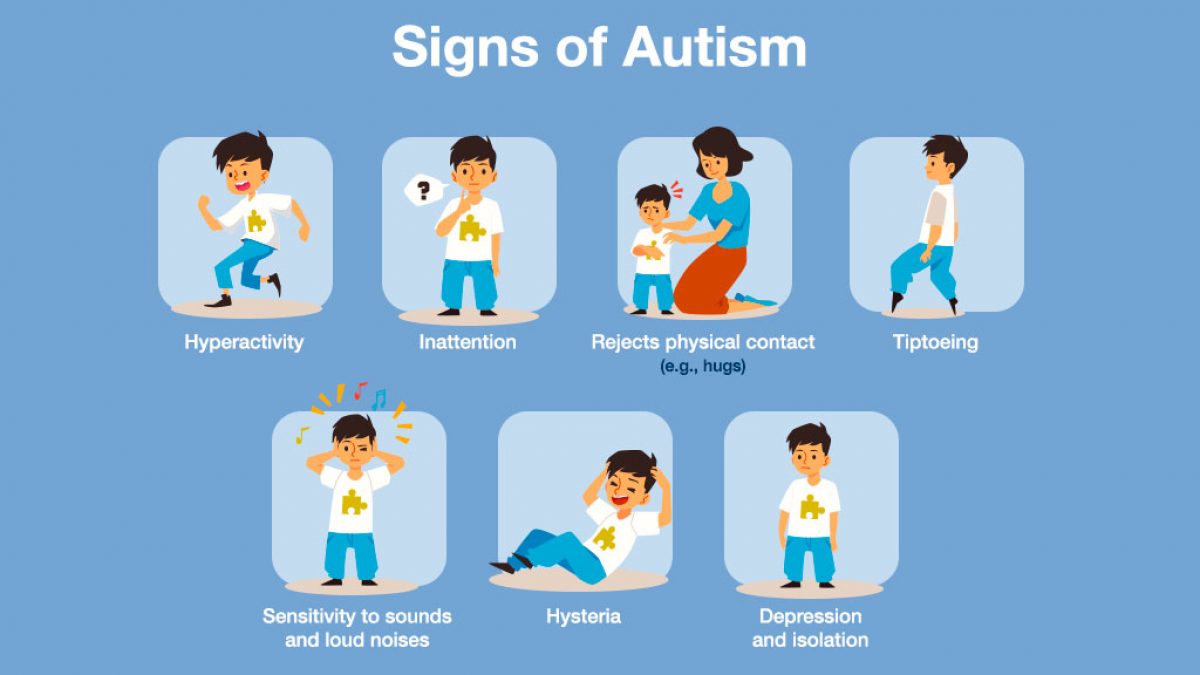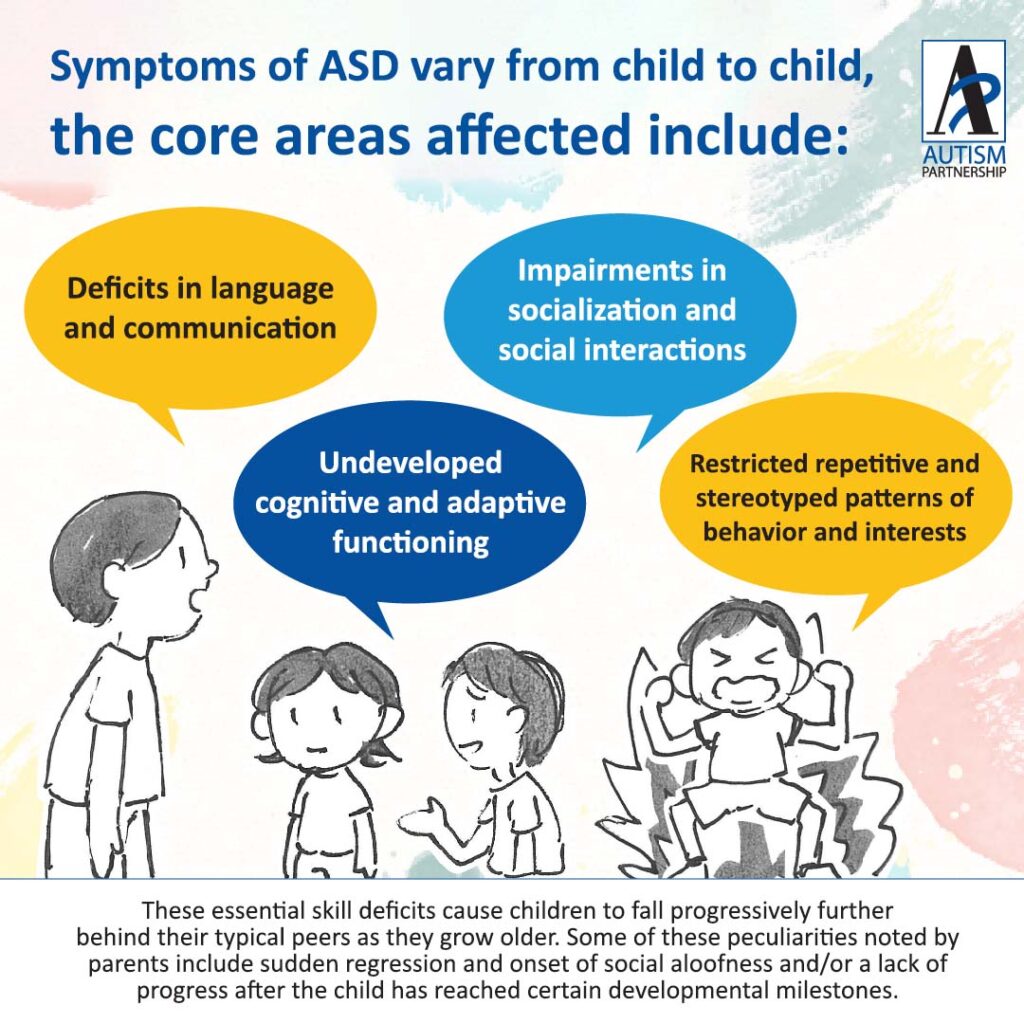Key Signs and Symptoms to Recognize in Individuals With Behavior Autism
When you encounter someone with behavioral autism, recognizing essential symptoms and signs is vital. You may discover difficulties in social interactions and communication, along with a solid requirement for routines. Additionally, sensory level of sensitivities can cause frustrating experiences. Comprehending these characteristics can improve your support and treatments, yet there's more to uncover about just how these habits manifest in day-to-day scenarios. Let's explore what these indicators truly look like.
Obstacles in Social Interactions
When you engage with someone on the autism range, you might observe they have a hard time with social signs and communication. These obstacles can make social interactions really feel overwhelming for them.
Furthermore, you might find that they favor regimens and acquainted settings, which can restrict their willingness to participate in brand-new social situations. They may speak concerning their interests in terrific information without noticing if you're interested when they do engage. This can result in discriminatory discussions that leave you feeling disconnected. Comprehending these obstacles can aid you approach interactions with compassion and patience, promoting a much more comfy setting for both of you.
Problem With Verbal and Non-Verbal Communication

Identifying these indications is essential, as it helps you better assistance and engage with individuals on the autism range. By recognizing their interaction challenges, you can promote a lot more purposeful links and provide a much more encouraging environment.
Repetitive Actions and Routines
Communication difficulties often come with other signs of autism, such as repetitive actions and a strong preference for routines. You might notice that individuals with autism frequently participate in certain, repetitive activities, like hand-flapping, rocking, or duplicating phrases. These habits can supply comfort and a sense of control in a typically frustrating globe.
Routines are equally important; lots of people flourish when they follow an organized timetable. You may find that modifications to these routines can result in significant distress. As an example, if they have a daily routine of consuming breakfast at a details time or complying with a particular path to school, any kind of interruption can trigger stress and anxiety.
Acknowledging these patterns helps you recognize their habits and provide assistance. By fitting their need for regular and allowing repeated activities, you can produce a much more comfy environment that reduces their challenges.
Sensory Level Of Sensitivities

Typical Sensory Triggers
Sensory sensitivities can significantly affect everyday life for people with autism, as specific stimulations frequently set off overwhelming reactions. Common sensory triggers include loud sounds, bright lights, and solid scents. You may see that sudden noises, like alarms or alarm systems, create anxiousness or distress. In a similar way, fluorescent lighting in stores can feel severe and unpleasant. Structures can likewise play a considerable role; harsh materials or specific food textures may be intolerable for you. Additionally, crowded areas can bewilder your senses, making it tough to loosen up or focus. Understanding these triggers can aid you handle your setting much better. By recognizing what impacts you, you can take steps to reduce pain and boost your day-to-day Visit Your URL experiences.
Behavioral Reactions Discussed
Understanding your behavior reactions to sensory sensitivities is vital, as they usually reveal exactly how you interact with the world. You could see that particular sounds, lights, or structures bewilder you, bring about anxiousness or pain. When confronted with these stimulations, you might withdraw, cover your ears, or perhaps react boldy. These responses aren't simply peculiarities; they're your means of dealing with overstimulation. You may also find yourself seeking specific sensory experiences, like deep stress or quiet environments, to aid ground on your own. Acknowledging these patterns assists you comprehend your needs much better and can guide exactly how you communicate them to others. By recognizing your sensory sensitivities, you can function in the direction of developing a setting that really feels much more workable and comfy for you.
Coping Strategies Summary
Acknowledging your sensory sensitivities is just the first action; currently it's time to discover coping methods that can assist you handle those experiences successfully. Begin by creating a sensory toolkit tailored to your needs. Developing an organized regimen can likewise offer predictability, decreasing anxiety around sensory overload.
Limited Passions and Emphasis
While numerous individuals create a large range of rate of interests, those with autism commonly show limited rate of interests and an intense focus on details subjects. You might see that a person with autism can spend hours diving into their favorite topic, whether it's a particular kind of train, a certain film, or a clinical idea. This extreme focus isn't simply a pastime; it can become a main part of their identification and social interactions.
You might find that discussions revolve around these passions, and they may have a hard time to engage in wider topics. For them, these concentrated interests supply comfort and a sense of proficiency. While it is necessary to urge exploration of brand-new subjects, appreciating their interests is equally useful site vital. By comprehending and recognizing these restricted passions, you can foster a helpful setting where they feel valued and comprehended, permitting more significant links and communications.
Emotional Guideline Difficulties
People with autism typically encounter challenges in psychological regulation, which can be influenced by their extreme concentrate on details rate of interests. You may discover that when an individual is deeply participated in a preferred activity, they can experience strong emotions, whether exhilaration or stress. When points do not go as intended., this intensity often makes it tough for them to shift equipments or handle their sensations - Autism Behavioral Therapy.

Variability in Developing Landmarks
When it comes to developmental turning points, you'll discover that individuals with autism often show a broad array of variability. You might see a youngster succeed in language skills but battle with social interactions.
It's necessary to recognize that each individual's journey is distinct. Some may establish complicated skills early, only to deal with difficulties in the future. Others may take longer to achieve basic landmarks yet after that flourish in particular areas. Observing these patterns can aid you recognize their staminas and needs better.
Often Asked Questions
Just How Is Autism Detected in Children and Adults?
To detect autism in adults and youngsters, experts assess actions, interaction skills, and social communications. If a specific satisfies the standards for autism spectrum problem., they typically use standard examinations, interviews, and monitorings to identify.
Exist Different Kinds of Autism Spectrum Disorders?
Yes, there are different kinds of autism spectrum problems, including Asperger's disorder and prevalent developmental disorder-not otherwise specified. Each kind differs in extent and qualities, so recognizing these distinctions can assist you far better support people with autism.
What Treatments Work for People With Autism?
When considering efficient treatments for individuals with autism, you'll discover choices like Applied Actions Analysis, speech therapy, and job-related therapy. Each method can assist boost communication, social skills, and everyday operating tailored to individual requirements.
Can People With Autism Lead Independent Lives?
Yes, people with autism can lead independent lives. With the right support, skills training, and sources, you can help them establish self-sufficiency, take care of day-to-day tasks, and thrive in different atmospheres, cultivating their freedom.
How Can Families Support Liked Ones With Autism?
You can sustain your liked ones with autism by developing an organized setting, urging their interests, practicing persistence, promoting interaction, and promoting social skills. Celebrate their achievements, no matter exactly how little, and develop a helpful neighborhood.
Although lots of individuals on the autism spectrum can comprehend and use language, they typically deal with considerable view website challenges with both non-verbal and spoken interaction. Identifying these indicators is necessary, as it assists you much better support and engage with people on the autism range. You could observe that individuals with autism typically engage in specific, repetitive activities, like hand-flapping, rocking, or repeating expressions.Sensory level of sensitivities can significantly impact everyday life for individuals with autism, as particular stimuli often set off frustrating responses.When it comes to developing turning points, you'll discover that individuals with autism usually reveal a broad range of irregularity.